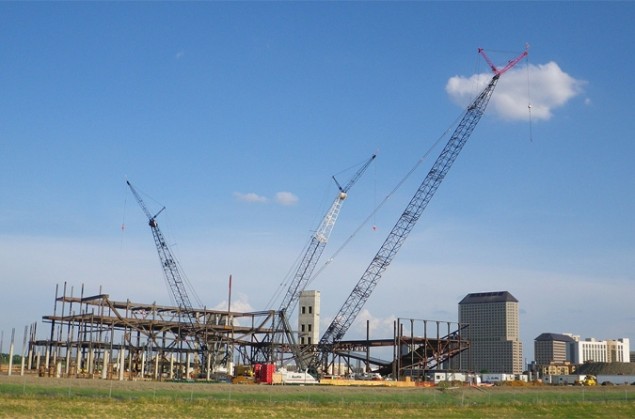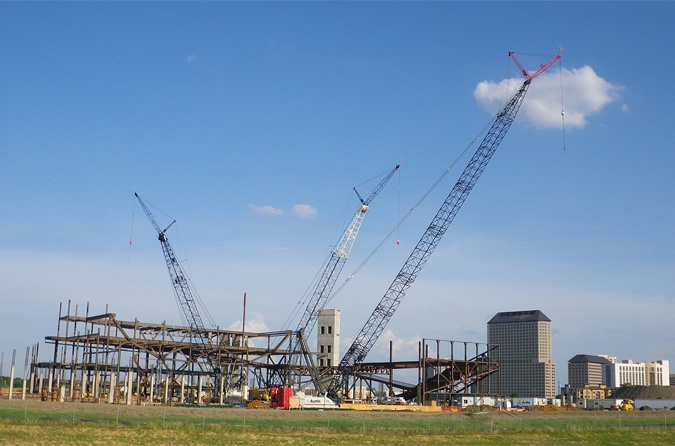
There’s a good article in today’s Dallas Morning News which digs into how rival transit organizations are grafting business from DART in suburban cities that never elected to become DART members. The DART board now fears that without continued expansion of the DART system, the region will become a patchwork of independent and competing transit systems, rather than a single — and presumably more efficient — system.
However, the problem, as the article clearly spells out, is that suburban cities don’t see the value in dedicating a one percent sales tax to be part of a transit system that only marginally serves their community. Why should they when they can just contract with glorified para-transit services to get the level of service they need, typically connecting people from their communities to existing DART stations? This motivation to use alternative providers was only exacerbated when the DART board tried to strong arm suburbs into joining their system last year, passing an ordinance which required municipalities that contracted bus service through DART to hold a referendum on becoming a DART member city. That policy has scared suburban cities away from DART and towards competing providers.
The problem is the DART board doesn’t seem to grasp what the real problem is here. While board members argue about how to best lure new communities into their system, DART continues to operate the most inefficient and useless transit system in the United States. DART’s funding scheme — gobbling up new members to get their sales tax revenue — resembles a pyramid scheme. Expansion doesn’t produce new service or greater efficiency, it just serves to pad the bottom line. Financial solvency is reliant on infinite expansion.
Here are the real funding problems facing DART, pulled from a Chicago Transit Authority peer study from 2012 (which, admittedly, is a couple of years old, but they still paint an accurate picture):
1. When compared with the top ten metro areas in the United States, it costs more per passenger to provide public transit service in Dallas than in any other area. In Chicago, the cost per trip is $3.45 per passenger trip. In Atlanta, $3.09. In Miami, $4.32. In New York it is $2.62. In Dallas, it is $6.52.
2. Dallas ranks dead last among ten major metros for operating cost per passenger mile, which is the total operating cost divided by the total number of miles traveled by passengers. In Dallas, that cost is $0.99. In Atlanta, it’s $0.59 In Miami, it’s $0.71. In Chicago, it’s $0.54.
3. Dallas ranks dead last in terms of total passenger trips and passenger trips per area resident.
4. Dallas also ranks last for fair ratio recovery, which is the proportion of operating costs that are covered by fare revenues paid by passengers. In Philadelphia, fare revenues cover 39 percent of operating costs. In Atlanta, it’s 32 percent. In Miami it’s 24 percent. In Dallas, just 14 percent of operating costs are covered by fare revenues.
5. Finally, Dallas is tied for last for fare revenue per passenger trip.
You can’t blame all these inefficiencies on the size and scope of DART’s network. DART decided to develop a system that follows the logic of urban sprawl, resulting in the “largest light rail system in the United States.” But despite its size, compared to other metro areas, the average length of a passenger trip on DART by miles is comparable. In Dallas, the average trip is 6.58 miles. Passengers all average longer trips in Miami, Houston, and Chicago. And again, Dallas ranks last when you look at the cumulative sum of the distances ridden by each passenger, that is, the average trip length multiplied by total passenger trips. This is to say that Dallas public transit covers a big area, but it doesn’t go to many places people want to go. And when people do use DART, they travel the same distances on public transit that people do in other cities.
In other words, what use is something big, if it costs too much, no one rides it, and it doesn’t take people where they need to go? When this question, more or less, was put to Michael Morris and his team from the NCTCOG during the AIA transit summit earlier this month (someone asked what ridership matrix they use for judging the success of DART’s light rail system), the mumbled response was “construction.” It was one of a number of telling non-answers that panel provided. We didn’t build a transit system; we concocted a real estate scheme.
DART’s problem isn’t that they need new funding sources. Their problem is that they need to figure out how to operate a more efficient, usable system. As the data above demonstrates, you cannot blame DARTs inefficiencies on our car-centric culture. Plus, look at what other sprawling cities are doing, like Los Angeles or Denver with its broad-based approached to transforming its transit system. How would a second downtown light rail alignment, an expanded and more sutured street car system, or a more efficient and usable inner-city bus network affect DART’s usability and efficiency of service? Those are the numbers the DART board should be chasing, not Mesquite’s sales tax pennies.
DART board members need to face the music: joining DART makes no economic sense for suburban cities, and many that are members would probably drop out if given the option. (How’s it going waiting for that promised rail line Addison? Bet you’d like a penny sales tax for an economic development fund like the one Frisco uses to toss cash at corporations and sports teams?) If DART is going to right the ship there needs to be less bickering about referendum requirements and more of a wholesale transformation of vision on the part of the DART board.





